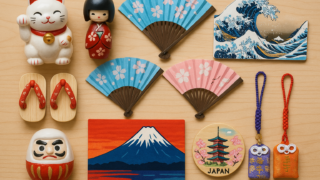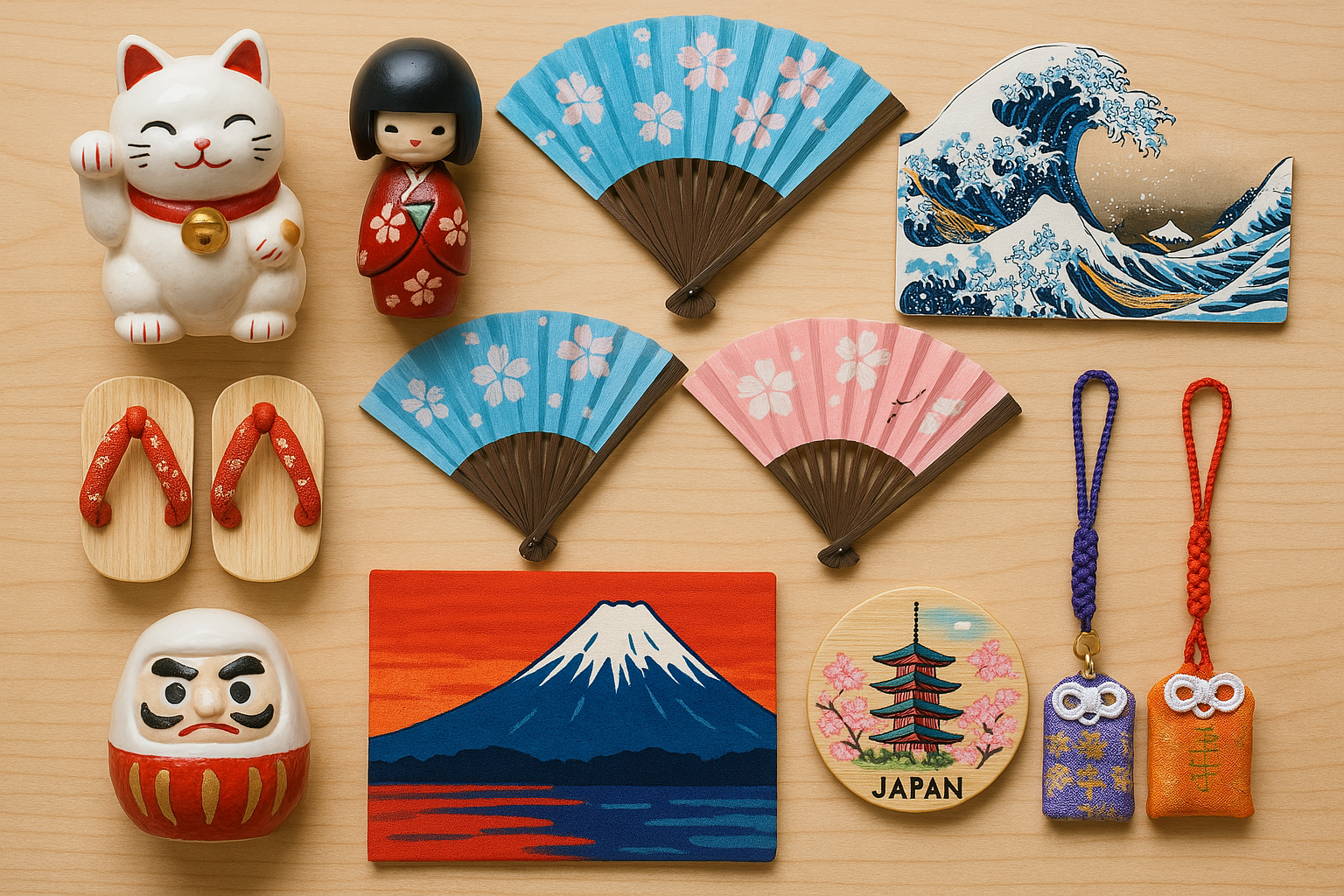Top Japanese Cultural Souvenirs That Foreigners Absolutely Love to Bring Home
- Introduction: Why Japanese Souvenirs Are So Special
- 1. Traditional Japanese Kimonos: A Timeless Souvenir
- 2. Japanese Tea Sets: A Taste of Japanese Culture
- 3. Handcrafted Japanese Fans: Beautiful and Functional
- 4. Japanese Pottery and Ceramics: Masterpieces for Your Home
- 5. Japanese Wooden Dolls: Folk Art with a Story
- 6. Japanese Stationery: A Gift That’s Both Beautiful and Practical
- 7. Maneki Neko: The Lucky Cat of Japan
Introduction: Why Japanese Souvenirs Are So Special
When it comes to souvenirs, Japan is like a treasure chest filled with unique, thoughtful, and cultural keepsakes. These items carry not just the essence of the country but also centuries of tradition. Whether you’re seeking a glimpse into Japan’s past or a piece of its modern flair, there’s something for every taste. From delicate handcrafted pieces to food that’s almost too beautiful to eat (but you totally should!), Japanese souvenirs offer more than just a memory of your trip—they allow you to take home a piece of Japan’s heart. Let’s explore some of the most beloved items that foreign visitors take home with them. Spoiler: you’ll probably want to buy them all!
1. Traditional Japanese Kimonos: A Timeless Souvenir
The Elegance of a Kimono
Imagine slipping into a piece of history—this is what it feels like to wear a kimono. Kimonos are not just clothes; they are a reflection of Japan’s rich culture. From the delicate silk to the intricate patterns, each kimono tells a story of beauty, grace, and tradition. They’re often worn for special occasions, but with so many designs, they’re now a fashionable souvenir for anyone who appreciates artistry. The kimono has evolved, with lighter versions like the yukata (summer kimono) making their way into casual wardrobes—perfect for a festival or tea ceremony. Wearing one feels like becoming part of something larger than yourself, and you’ll certainly get plenty of looks and compliments when walking the streets of Tokyo or Kyoto!
Different Types of Kimonos to Choose From
When shopping for a kimono, the options can be overwhelming—like walking into a candy store for culture lovers! There’s the formal silk kimono, typically worn for weddings or tea ceremonies, and the more casual yukata, which is perfect for summer festivals. For a lighter souvenir, consider a “hifu” or “hifu kimono,” a short jacket-style kimono that’s wearable year-round. Don’t forget the accessories: obis (wide sashes) and geta (wooden sandals) are the perfect additions to complete your outfit. Tip: Remember to ask for assistance if you’re unfamiliar with wearing a kimono, as it can be a bit tricky to get the layers just right!
2. Japanese Tea Sets: A Taste of Japanese Culture
The Art of Tea in Japan
If you’ve ever attended a Japanese tea ceremony, you know how deeply the culture of tea is intertwined with Japanese life. But even if you haven’t, a traditional Japanese tea set will give you a little piece of that world. Tea in Japan is more than just a drink; it’s a form of art, complete with its own set of rituals. The simple act of making and sipping tea becomes a meditative practice, and you can bring that tranquility home with a beautiful tea set. The elegance of the porcelain, the smoothness of the tea, and the calming ritual of preparing it make a tea set one of the most thoughtful souvenirs from Japan.
Where to Find the Best Tea Sets in Japan
Tea sets can be found in almost every souvenir shop in Japan, but for the true collector, head to the specialized pottery towns. Places like Kutani, Arita, and Uji are famous for their exquisite ceramics and high-quality tea ware. You’ll find teapots, tea cups, and even matcha bowls—each one meticulously crafted by skilled artisans. It’s the perfect souvenir if you want something practical yet deeply tied to Japanese culture. Pro tip: Ask about the different types of teapots, as some are designed specifically for loose leaf tea, while others are more suited to traditional powdered matcha.
3. Handcrafted Japanese Fans: Beautiful and Functional
The History Behind Japanese Fans
Japanese fans are not just a way to cool off—they’re an art form. The folding fan (sensu) and the flat fan (uchiwa) are both iconic pieces of Japanese culture, but they also serve a practical purpose. They’re made with delicate materials like paper, bamboo, and silk, and often feature intricate designs, from beautiful florals to symbolic representations of nature. In the summer months, locals use them to stay cool, but they also carry cultural significance in festivals, dances, and rituals. Owning one of these fans is like holding a slice of Japan’s timeless elegance in your hands.
Unique Designs for Every Taste
Fans come in all shapes, sizes, and designs—so whether you’re looking for something simple or something more extravagant, there’s a fan for you. The sensu is a traditional folding fan, often adorned with vibrant designs that reflect nature or traditional motifs like cranes, cherry blossoms, or waves. The uchiwa, on the other hand, is a flat, round fan typically used in festivals. They’re often larger and can come in a variety of colors and patterns. You might even find limited-edition designs featuring modern Japanese pop culture icons or scenic landscapes! It’s a fun, colorful way to bring home a piece of Japan’s artistic traditions.
4. Japanese Pottery and Ceramics: Masterpieces for Your Home
Famous Japanese Pottery Regions
Pottery has been an integral part of Japanese culture for centuries, and Japan is home to some of the world’s most renowned pottery regions. Each area has its unique style, and these ceramics make excellent souvenirs for anyone who appreciates craftsmanship. From the rustic, earthy tones of the Bizen pottery in Okayama to the intricate, hand-painted designs of Arita porcelain, there’s a piece of Japan’s pottery heritage for every taste. A beautiful vase, bowl, or tea cup can make a statement in your home, telling the story of Japan’s rich tradition of pottery making.
How to Choose the Right Pottery Piece
When selecting pottery, think about the piece’s function, aesthetic, and story. Some pieces are made with a rough, earthy look, while others are delicate and polished with beautiful glazes. If you’re drawn to modern, minimalist designs, you might enjoy the sleek look of Kutani porcelain. If you prefer a more traditional approach, try a piece from Shigaraki, known for its rustic, unglazed pottery. Whether you choose a carefully crafted sake set or a decorative tea bowl, each piece offers a unique glimpse into Japan’s long history of artistry.
5. Japanese Wooden Dolls: Folk Art with a Story
Kokeshi Dolls: A Symbol of Japan’s Craftsmanship
Wooden dolls, particularly Kokeshi dolls, are a beautiful and timeless souvenir from Japan. These hand-carved, painted dolls were traditionally made by artisans in northern Japan, and each one has its own personality and charm. Kokeshi dolls are known for their simple, yet expressive faces, and their bright colors often reflect the changing seasons or aspects of nature. They’re not just decorative pieces—they represent a piece of Japanese folk art, and each one tells a story of craftsmanship passed down through generations. You’ll often see them as a symbol of good luck and happiness.
Other Wooden Dolls to Consider
Beyond Kokeshi dolls, there are many other types of wooden figurines that make great souvenirs. Daruma dolls, for example, are small, round, red figures that are believed to bring good fortune. Originally used as a symbol of perseverance, Daruma dolls have become popular as a good luck charm. If you’re looking for a unique souvenir, try a hand-carved figure representing a traditional Japanese character, such as a samurai, geisha, or sumo wrestler. These wooden dolls may be small, but they carry a large amount of meaning.
6. Japanese Stationery: A Gift That’s Both Beautiful and Practical
Why Japanese Stationery Is Famous Worldwide
If you’ve ever used Japanese stationery, you know it’s not just about writing—it’s about the experience. Known for its superior quality and attention to detail, Japanese stationery is a delight for anyone who appreciates beautiful paper, smooth writing instruments, and creative designs. Whether you’re gifting it to a friend or keeping it for yourself, Japanese stationery brings a bit of joy to your day. From delicate washi paper to perfectly crafted pens, Japanese stationery elevates the simple act of writing into an art form.
Popular Japanese Stationery Brands
For stationery lovers, Japan is like paradise. Brands like Muji, Pilot, and Sailor are renowned worldwide for their exceptional quality. Whether you’re looking for simple, functional tools or elegant, beautifully designed pieces, you can find it in Japan. Washi tape is also a must-have, with its endless designs ranging from traditional motifs to contemporary patterns. If you’re a fan of journaling or scrapbooking, Japan’s stationery stores will quickly become your new favorite spot. Pro tip: Don’t forget to stock up on these goodies—they’re perfect gifts for anyone back home!
7. Maneki Neko: The Lucky Cat of Japan
The Symbolism Behind the Maneki Neko
No trip to Japan is complete without encountering a Maneki Neko—the “lucky cat.” These charming little figures, often seen in restaurants, shops, and homes, are said to bring good fortune and prosperity. The cat is typically depicted with one paw raised in a welcoming gesture, inviting good luck into the space. Whether you’re superstitious or just a fan of cute cat figurines, the Maneki Neko is one souvenir that’ll brighten up your day—and your home!
Where to Find the Perfect Maneki Neko
Maneki Neko can be found in nearly every souvenir shop across Japan. They come in all shapes, sizes, and colors—each symbolizing a different type of luck. Gold versions are especially popular, symbolizing wealth and prosperity, while white ones represent purity and happiness. You can even find limited-edition designs in major cities, with different styles that reflect local culture. Whether you prefer a traditional porcelain version or a more modern take, the Maneki Neko is a must-have souvenir from Japan!









コメント